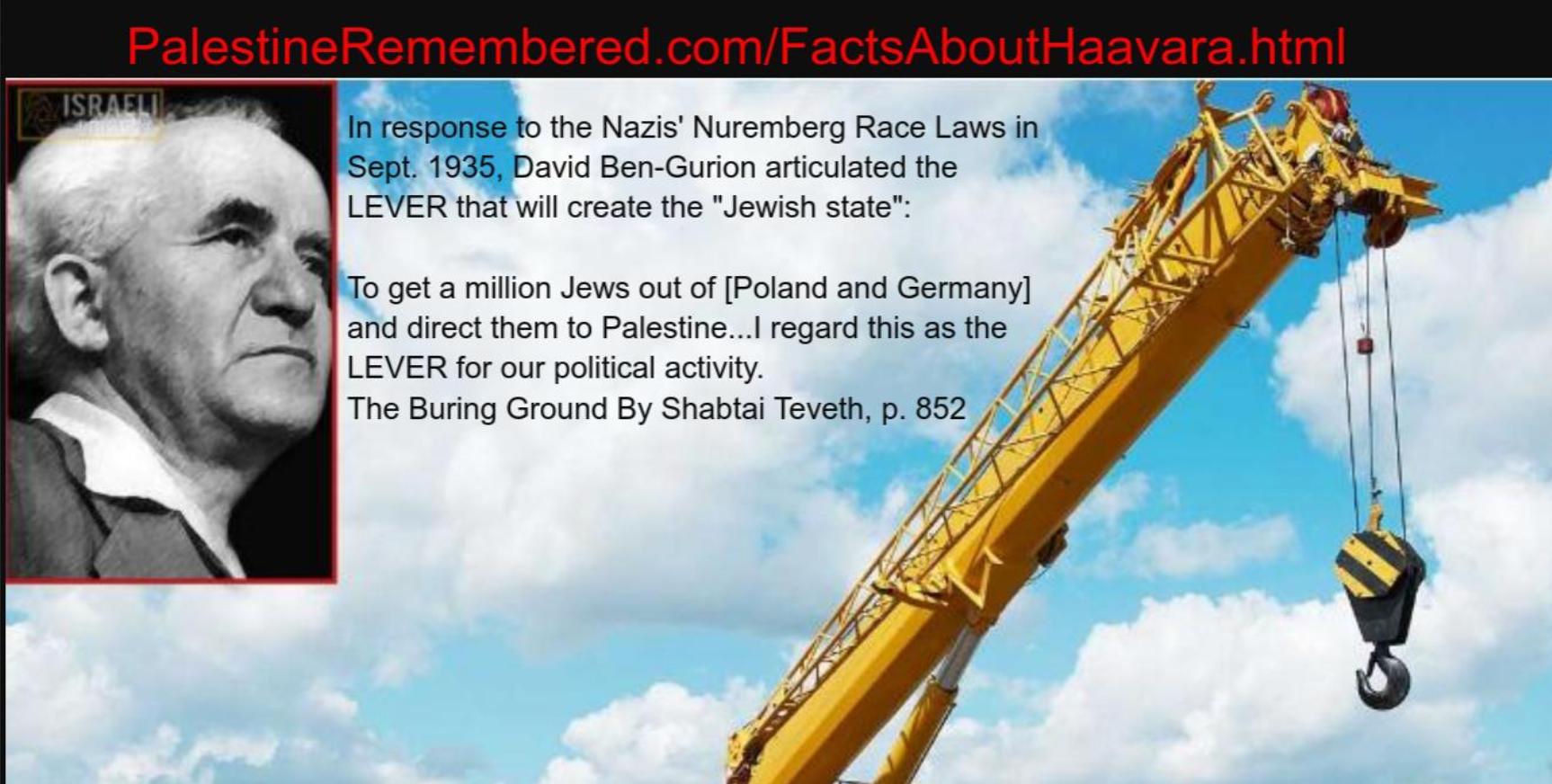 David Ben-Gurion envisioned that Nazis' Nuremberg Race Laws would become the LEVER that would end up creating the "Jewish state," but how? Click the image for the details
David Ben-Gurion envisioned that Nazis' Nuremberg Race Laws would become the LEVER that would end up creating the "Jewish state," but how? Click the image for the details In mid-1943, with millions of Jews already murdered and millions more trapped in Nazi-occupied Europe, Chaim Weizmann—elder statesman of Zionism and supposed conscience of the Jewish people—sat down with Franklin Delano Roosevelt (a.k.a. FDR).
This was not an ordinary moment. The Bermuda Conference of April 1943 had just closed without action, a shameful performance of Allied indifference. By then, Auschwitz was running day and night. Transports from Greece, Holland, and Poland were arriving in an almost uninterrupted flow (actually, train shipments' news used to be transmitted in real-time). If ever there was a moment to press the case for rescue at the highest level of power, this was it.
And what did Weizmann do? He remained silent. He did not raise rescuing European Jewry whatsoever. He did not ask Roosevelt to bomb rail lines or death camps. He did not even plead for expanded havens. He spoke instead of Palestine. He spoke of the “future Jewish Commonwealth.” He spoke the language of the Biltmore Conference, not of Auschwitz.
The Convenient Myth of the “Reluctant Zionist”
For decades, sympathetic historians have painted Weizmann as a reluctant player in this tragedy. They note his hesitancy at the Biltmore Conference of May 1942, where David Ben-Gurion forced through the maximalist demand for a Jewish state. They cast him as a tragic moderate, sidelined by harder men.
But this myth collapses when we look squarely at 1943. By then, Weizmann had folded. His meeting with Roosevelt proves it. Faced with the chance to confront the most powerful man alive about the fate of millions, Weizmann said nothing.
This silence was not incidental. It was the logical consequence of the new Zionist consensus: rescue was secondary, Palestine was primary.
What Silence Meant
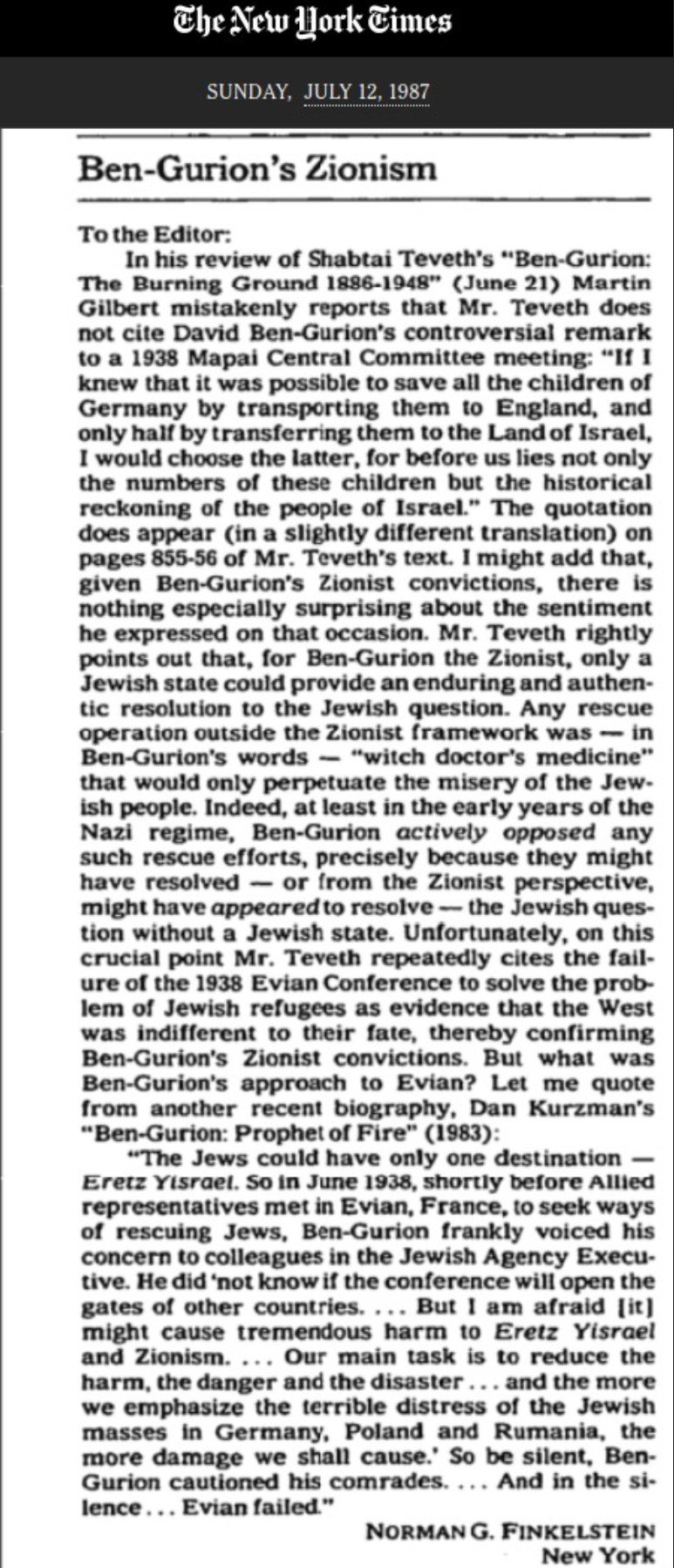 David Ben-Gurion's Response to the British Kindertransport a month after Kristallnacht: NY Times, July 12th, 1987, citing Ben-Gurion's official biographers showing how much he "cared" about Europe's Jews who saved themselves by immigrating to countries other than Palestine!
David Ben-Gurion's Response to the British Kindertransport a month after Kristallnacht: NY Times, July 12th, 1987, citing Ben-Gurion's official biographers showing how much he "cared" about Europe's Jews who saved themselves by immigrating to countries other than Palestine!When Weizmann kept silent in Roosevelt’s presence, he was affirming a policy already articulated in Palestine. Consider David Ben-Gurion’s infamous remark in December 1938, weeks after Kristallnacht:
“If I knew that it would be possible to save all the children of Germany by bringing them over to England, and only half of them by transporting them to Eretz Israel, then I would opt for the second alternative.” (NY Times, July 12, 1987)
He never retracted this hate speech. In fact, ten days later, he doubled down on his antisemitism, warning that separating the “refugee problem” from the “Palestine problem” would “risk the existence of Zionism.” (The International Diplomacy of Israel's Founders by John Quigley, p. 51-52 and The Other Israel by Arie Bober, p. 171)
Weizmann’s silence before Roosevelt was cut from the same cloth. It was an endorsement of the Jewish Agency’s wartime budgets, which devoted millions to settlement and almost nothing to rescue. It was an enactment of Yitzhak Gruenbaum’s notorious declaration:
“I think it must be spelled out here: Zionism comes first. And if we face the question whether to allocate funds to the Keren HaYesod [settlement] or to rescue, I vote without hesitation for Keren HaYesod.”(cited by Wikipeda)
That is what silence meant. It meant prioritizing the project of statehood over the survival of the Jews who most needed saving.
The Logic of Catastrophic Zionism
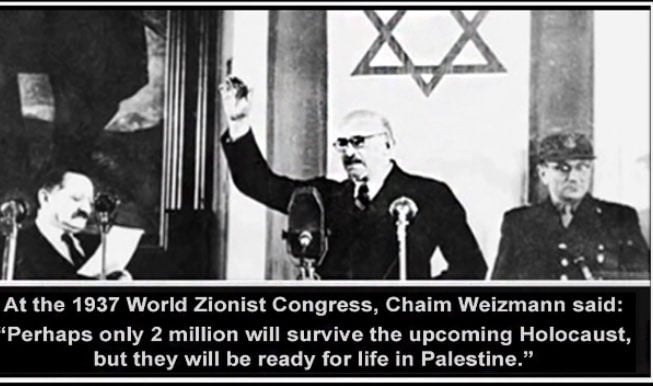 Catastrophic Zionism at its worst: Zionists often spoke of the Holocaust decades before its time. What did Zionists do to confront it? Zionists were the FIRST to normalize trade with the Nazis!
Catastrophic Zionism at its worst: Zionists often spoke of the Holocaust decades before its time. What did Zionists do to confront it? Zionists were the FIRST to normalize trade with the Nazis!This was not cowardice, nor was it oversight. It was catastrophic Zionism in practice: the belief that only a great catastrophe could supply the lever to establish the "Jewish state."
Weizmann himself had said as much in 1937, testifying before the Royal Commission. Asked whether six million Jews could be brought to Palestine, he replied:
“No… The old ones will pass, they will bear their fate or they will not. They are dust, economic and moral dust in a cruel world… Two millions, and perhaps less, shall survive.” (Time of Israel Blog)
He spoke these words four years before Hitler’s Final Solution. In 1943, he was simply living them out.
Where Were the Critics?
Did other Jewish leaders denounce Weizmann’s silence? The record is damning.
At the American Jewish Conference in fall 1943, more than 500 delegates debated rescue and Palestine. The majority ratified the Biltmore line: rescue must not compete with statehood. The few dissenters—Joseph Proskauer, Robert Goldman—objected not to the principle but to the timing.
When hundreds of rabbis marched on Washington in October 1943 to demand action, mainstream Jewish leaders—including Rabbi Stephen Wise—advised Roosevelt not to meet them. They sneered that the marchers were “unrepresentative,” too Eastern, too provincial. Roosevelt complied.
In Palestine, when proposals surfaced to divert Jewish National Fund money to rescue, Gruenbaum thundered against them, calling such demands “antisemitic.” Newspapers condemned him, but the policy held.
The result: silence was normalized. Criticism was muted, marginalized, or mocked.
The Allied Cover Story
Historians often point the finger at Roosevelt or Churchill—and rightly so. Both turned away from rescue proposals, citing “military priorities.” But this misses the deeper point: when Jewish leaders themselves refrained from pressing the case. Therefore, why should Allied leaders take risks?
Imagine FDR’s position: if the leaders of world Jewry sat across from him and did not demand rescue, why would he expend political capital on it? His silence mirrored theirs.
Imagine the Counterfactual
Let us update the analogy. Imagine Mahmoud Abbas meeting Donald Trump at the United Nations while Gaza burns. Imagine he spends the entire meeting talking about a future Palestinian state, never once pleading for relief for starving children.
Palestinians would call it treason. And they would be right.
That is exactly what Weizmann did in 1943. He betrayed the living for the dream of the state. We have little doubt that the Jews who were living in the death camps would have called him the Kapo in Chief
The Brutal Truth
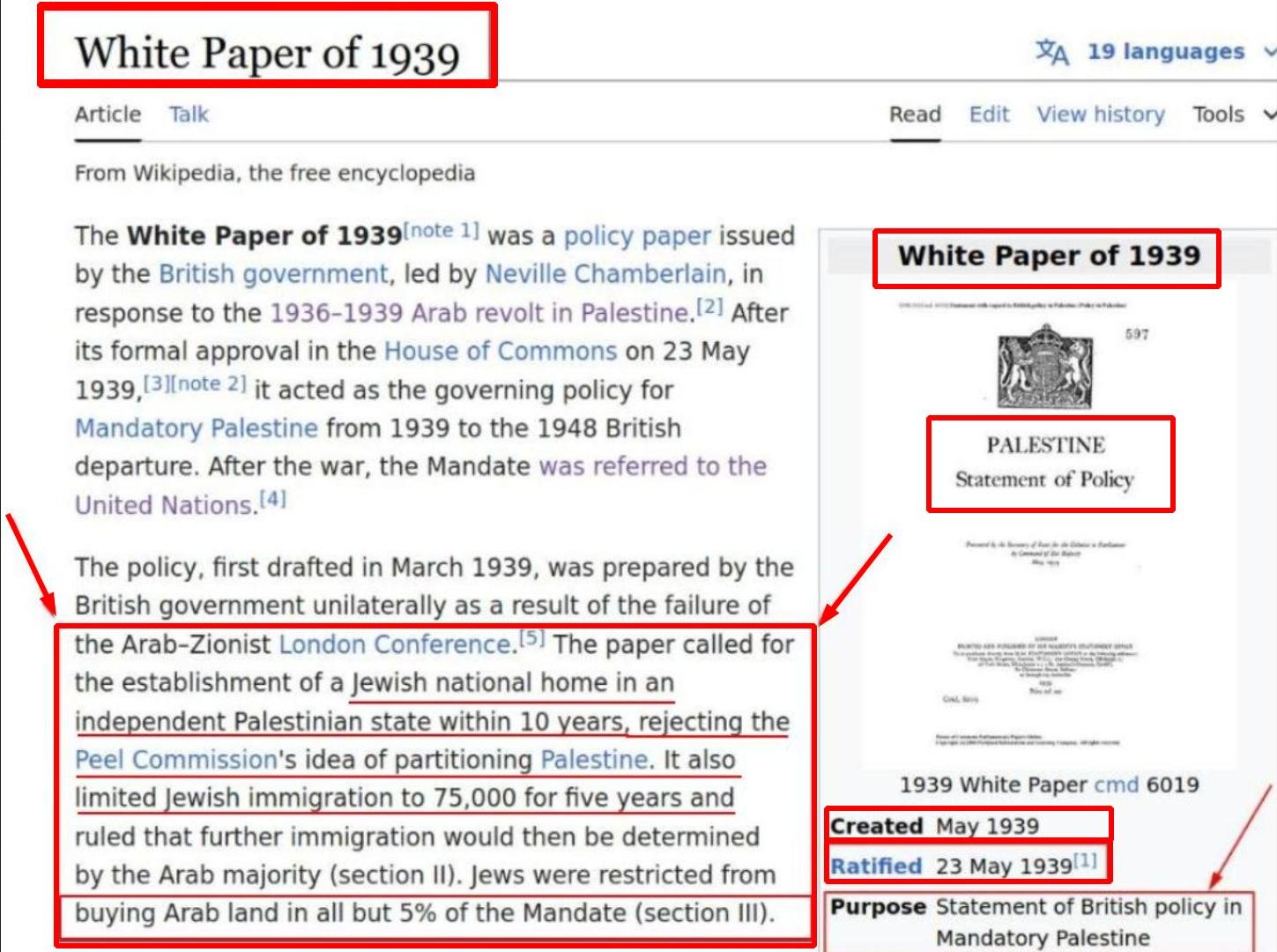 Were the British so STUPID as to promise COMPLETE INDEPENDENCE to Palestinians in 1939 (who, of course, "didn't exist") while the Indians had been DREAMING of such a thing for 400 years?
Were the British so STUPID as to promise COMPLETE INDEPENDENCE to Palestinians in 1939 (who, of course, "didn't exist") while the Indians had been DREAMING of such a thing for 400 years?The brutal truth is that by 1943, the Zionist movement needed catastrophe more than it needed rescue. Ben-Gurion himself admitted as much, calling Jewish suffering the LEVER to create Israel.
This explains why the Jewish Agency resisted funding rescue. Why Gruenbaum said no to allocating settlement money. Why Apolinary Hartglas of the Rescue Committee could declare in 1943 that European Jewry’s fate was sealed, and resources should be focused on building Palestine.
The parachutists sent to Europe? Fewer than 40. The Jewish Brigade? Kept from combat until the last weeks of the war. The budget? Spent on land, immigration, and politics.
The movement was consistent. It was not fighting Hitler. It was fighting the British White Paper of 1939. Hitler was left to the Gentiles.
Why Historians Avoid This
And yet, when you read the mainstream Holocaust historians, you will rarely see this framed so bluntly. Lucy Dawidowicz, David Wyman, Tom Segev, Yehuda Bauer—they cite the facts, but they soften the framing. Segev describes Zionists as “weak and helpless.” Porat adds “perhaps” to every incriminating line. Bauer insists Zionism did what it could.
Only outsiders—Lenni Brenner, Tony Greenstein, Norman Finkelstein in rare moments—connect the dots. Edwin Black came closest in The Transfer Agreement:
“These men were the creators of Israel. And in order to do so, each had to touch his hand to the most controversial undertaking in Jewish history.”
But even Black hedged at the end: was it madness, or genius? The facts were clear, the framing equivocal.
Why This Still Matters
Why does this matter, eighty years later? Because it shows that silence was not forced upon Zionist leaders by weakness or ignorance. It was chosen. It was a strategy.
And because it parallels the present. In 2023–25, as Gaza is reduced to rubble, Israeli leaders frame the war not as humanitarian but existential. Civilian suffering is written off as “collateral,” just as European Jews were once written off as “dust.” Again, the project of statehood outweighs the value of Jewish—or Palestinian—lives.
Conclusion
The myth of Weizmann as a tragic moderate collapses under the weight of one fact: in 1943, he met Roosevelt and said nothing about rescue.
That silence was not an accident. It was a policy. It was catastrophic Zionism made flesh.
And it leaves us with a haunting counterfactual: what if the Jewish leader in that room had pleaded for rescue, and not for a state? Would millions have lived?
We cannot know. But we can say this: a people who refuse to confront their own leaders’ choices in their darkest hour risk repeating them. And history will not always forgive.
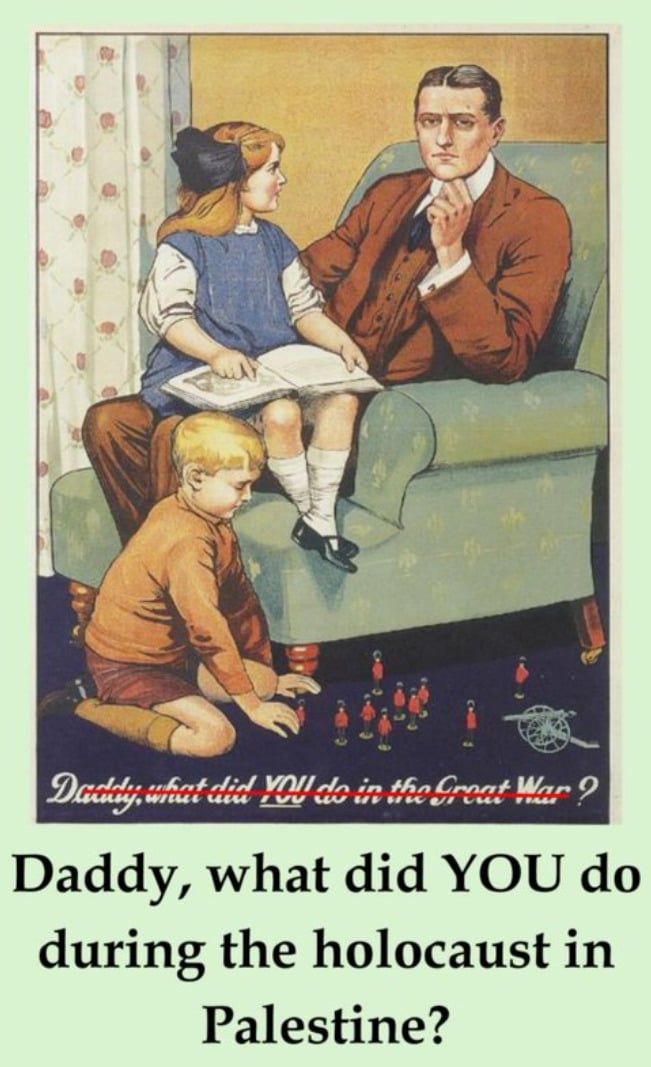
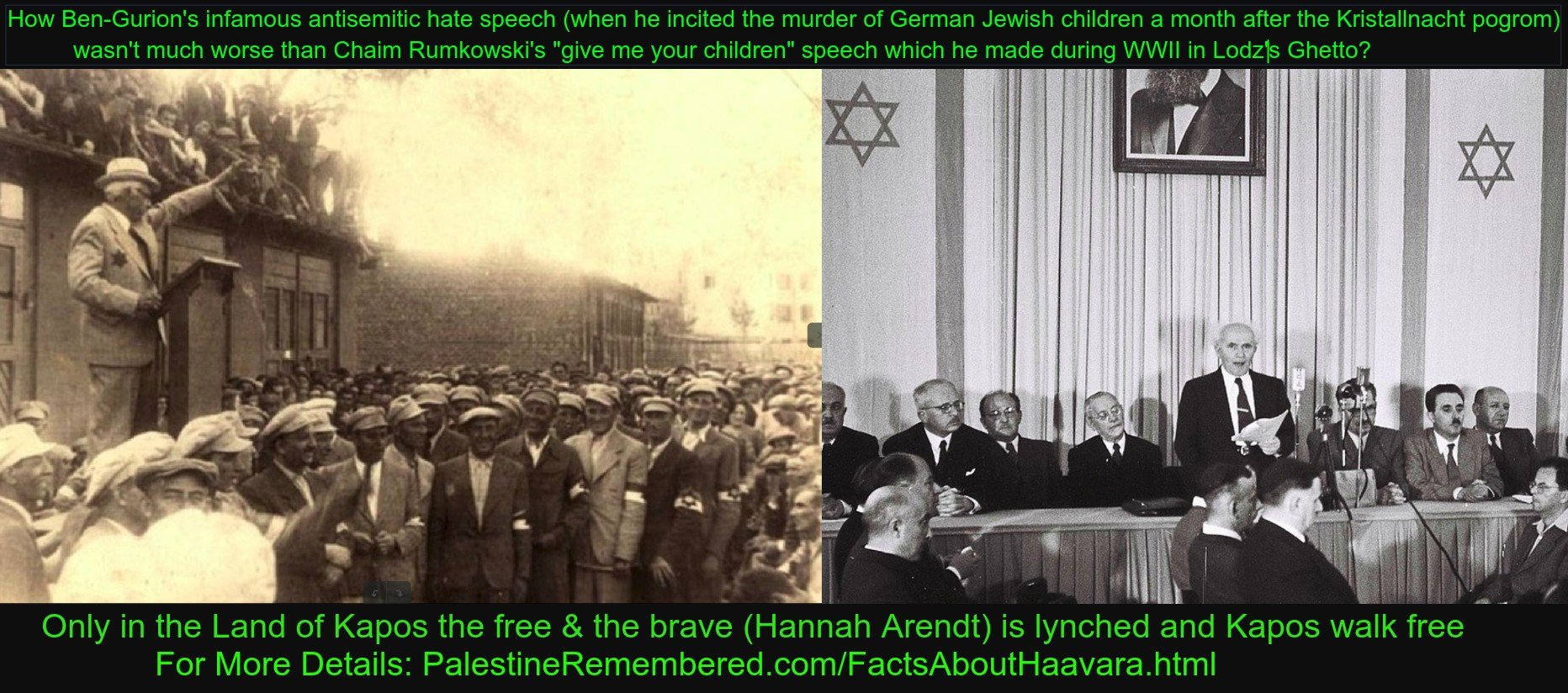


Post Your Comment
*It should be NOTED that your email address won't be shared, and all communications between members will be routed via the website's mail server.